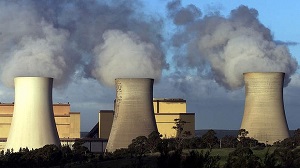The Australian Conservation Foundation has initiated a new legal challenge to Adani’s huge Carmichael coal mine proposal.
In what it has called a “historic, landmark case”, the ACF argues that Federal Environment Minister Greg Hunt failed to consider whether the impact of burning coal and climate pollution would be inconsistent with Australia’s international obligations to protect the Great Barrier Reef.
- ACF president Geoff Cousins said the Environment Protection and Biodiversity Conservation Act stated that the Minister must not act inconsistently with Australia’s responsibilities under the United National’s World Heritage convention.
The ACF will be represented by the Environmental Defenders Office in Queensland. The case will take three to six months to be heard and a similar period for the judgement. The ACF says it is not interested in delay, they want to stop the mine.
Principal solicitor Sean Ryan said they would be seeking compliance with Australian and international law. There’s more at the SMH, at New Matilda, and at The Courier Mail:
- “Our case is that the burning of coal overseas is an indirect consequence that the Minister must have regard to when considering the impacts on the Great Barrier Reef,” he said.
He said Mr Hunt had given regard to overseas emissions in reapproving the project but had argued that it was difficult to quantify whether the Carmichael mine would actually cause additional global emissions as this depended on a range of variables.
“The problem with that is he hasn’t had regard to the precautionary principle which says when there’s uncertainty about environmental impacts but there is a risk of those impacts being serious and irreversible you should act cautiously,” Mr Ryan said.
He said that “the grounds for review include one in relation to the threatened Black-throated Finch, and three in relation to climate change and the Reef”.
The Newman Government in Queensland had respricted third party challenges, but the Palaszczuk government had reinstated them. However, State Development and Mining Minister Anthony Lynham was worried about the effects on mining investment and has said he would take a proposal to put time limits on cases in the Land Court to Attorney-General Yvette D’Ath.
This case is being brought in the Federal Court, and is against the Commonwealth actions.
The Abbott Government was upset by the challenge brought by The Mackay Conservation Group over a snake and a skink species. Attorney General George Brandis moved to stop third party challenges. The proposed legislation is now with a Senate committee and the reporting date has been extended from October to February.
ACF president Geoff Cousins says:
- ACF has launched “legitimate legal action in the public interest” and that the ability to bring such cases “is central to keeping governments accountable in a democracy”.
“This action is historic; it’s the first case that has sought to test the Environment Minister’s World Heritage obligations as they relate to the climate change impacts on the Reef caused by pollution from burning a mine’s coal,” Cousins said.
“If this case is successful it will strengthen climate change considerations and World Heritage protection in Australian law.”
There are important principles at stake. Nevertheless the mine faces an uphill battle because bankers are increasingly unwilling to fund it and there may be a paradigm shift in favour of solar happening in India as we speak.


If the ACF is successful on these grounds, would that not infer that ALL coal mining is caught by the ruling. Indeed, perhaps any activity could be condemned on those grounds.
Geoff, obviously I’m not a lawyer, but it seems to focus on the approvals process. Perhaps there may not be any retrospectivity, but would have implications for any mine development from here on.
Certainly Cousins sees it as a precedent with consequences.
This is a significant move with substantial implications for how the law will deal with climate change issues more generally. Wouldn’t be surprised to see this appealed whatever the results in the first court of hearing because of the implications.
India will triple their coal burning over the next 25 years, regardless of this.
Where they get it from will be very happy, probably Indonesia or Africa.
There is plenty of the stuff about.
Jumpy, that’s the drug smuggler’s defense.
If we show the world we don’t care about burning coal and its effect on the Reef why should we expect them to care?
Did you read the link at the end of the post?
In India, US firm SunEdison won the entire 500MW of solar capacity on auction in the state of Andhra Pradesh, quoting a record low tariff for India of INR 4.63/kWh (US7.1c/kWh). Again, this was unsubsidised. And again, it beats new coal generation, particularly generation using imported coal.
Also, this article.
Peak coal may have already happened, as increases in India are being more than offset elsewhere.
Jumpy: In theory a country like Australia with its small population will be able to survive climate change unless it is invaded by large, nuclear powered neighbours that can no longer feed themselves.
By contrast, countries like India may really struggle to feed their populations when their climate changes. They have a lot more to gain by cutting CO2 emissions now.
Yes, well, I’ll look at past efforts by them. They’ve been known to fudge a bit.
Fact is they will go with the cheap and reliable.
Another fact is reefs prefer warmer,
more acidiccloser to neutral than more basic, environments.Whatever pressures are harming the GBR, human caused or natural, co2 is not one of them.
Basically, a warming world won’t hurt everything. Some will benefit.